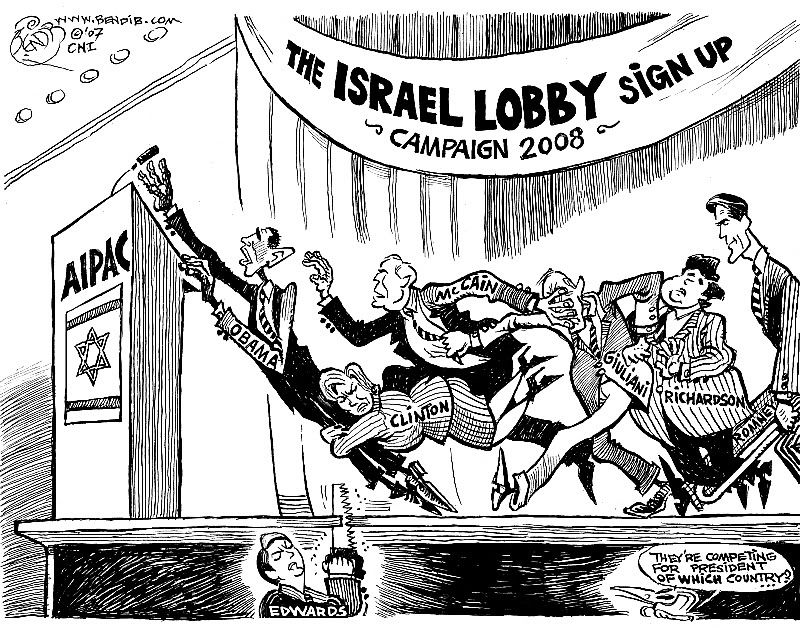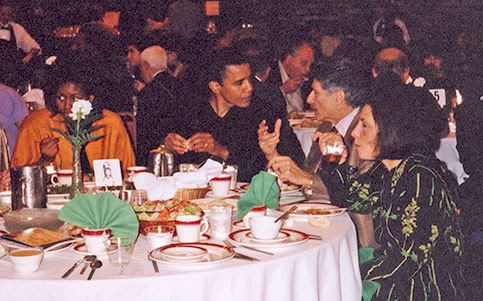
(Reprinted with CNI permission. In order, we have Obama, Hillary, McCain, Guliani, Richardson, Romney, with Edwards cutting on the stage, and an elfin figure claiming, “They’re competing for Presidenbt of which country?)
A few days ago, I posted a diary called “Hillary’s Middle East problem.” Criticism immediately surfaced as to why just Hillary? Those critics were correct. As shown by the CNI cartoon above, candidates in the Democratic as well as the Republican party are pandering to the Israel Lobby.
Why just Hillary? Because Hillary is so extreme in her advocacy of right wing Zionism, the only one among the Democratic candidates regarding the Israeli-Palestinian conflict who was distinctly anti-Palestinian, and who repeated Israel propaganda in degree to ask whether she is running for Prime Minister of Israel instead of the US presidency. Hillary’s advocacy of right wing Zionism guarantees that as president she will continue, not only with the Bush wagging tail, but support of Israel’s colonialism of the entire West Bank, thus ruling out any possibility for a two state solution. Hillary not only doesn’t have a Road Map, she has no admitted clue concerning the human rights injustices that is being perpetrated against the Palestinian people. Else, she does but doesn’t give a damn. What has the Democratic party come to be?
Ali Abunimah, cofounder of the The Electronic Intifada, on March 4, 2007 wrote this
personal essay about Obama’s newly discovered dedication to the Israel Lobby. The title is Abunimah’s. Yes, Obama is now a committed supporter (electively blind) of Israel’s occupation and colonial effort to disenfranchise the Palestinians of an independent, sovereign state. But it was not always that way.
Speaking about Obama, Abunimah notes,
THE NEW OBAMA
I first met Democratic presidential hopeful Senator Barack Obama almost ten years ago when, as my representative in the Illinois state senate, he came to speak at the University of Chicago. He impressed me as progressive, intelligent and charismatic. I distinctly remember thinking ‘if only a man of this caliber could become president one day.’
On Friday Obama gave a speech to the American Israel Public Affairs Committee (AIPAC) in Chicago. It had been much anticipated in American Jewish political circles, which buzzed about his intensive efforts to woo wealthy pro-Israel campaign donors who up to now have generally leaned towards his main rival Senator Hillary Clinton.
Reviewing the speech, Ha’aretz Washington correspondent Shmuel Rosner concluded that Obama “sounded as strong as Clinton, as supportive as Bush, as friendly as Giuliani. At least rhetorically, Obama passed any test anyone might have wanted him to pass. So, he is pro-Israel. Period.”
Israel is “our strongest ally in the region and its only established democracy,” Obama said, assuring his audience that “we must preserve our total commitment to our unique defense relationship with Israel by fully funding military assistance and continuing work on the Arrow and related missile defense programs.” Such advanced multi-billion dollar systems he asserted, would help Israel “deter missile attacks from as far as Tehran and as close as Gaza.” As if the starved, besieged and traumatized population of Gaza are about to develop intercontinental ballistic missiles.
Obama offered not a single word of criticism of Israel, of its relentless settlement and wall construction, of the closures that make life unlivable for millions of Palestinians.
There was no comfort for the hundreds of thousands of people in Gaza who live in the dark, or the patients who cannot get dialysis, because of what Israeli human rights group B’Tselem termed “one cold, calculated decision, made by Israel’s prime minister, defense minister, and IDF chief of staff” last summer to bomb the only power plant in Gaza,” a decision that “had nothing to do with the attempts to achieve [the] release [of a captured soldier] nor any other military need.” It was a gratuitous war crime, one of many condemned by human rights organizations, against an occupied civilian population who under the Fourth Geneva Convention Israel is obligated to protect.
While constantly emphasizing his concern about the threat Israelis face from Palestinians, Obama said nothing about the exponentially more lethal threat Israelis present to Palestinians. In 2006, according to B’Tselem, Israeli occupation forces killed 660 Palestinians of whom 141 were children — triple the death toll for 2005. In the same period, 23 Israelis were killed by Palestinians, half the number of 2005 (by contrast, 500 Israelis die each year in road accidents).
(snip)
There was absolutely nothing in Obama’s speech that deviated from the hardline consensus underpinning US policy in the region. Echoing the sort of exaggeration and alarmism that got the United States into the Iraq war, he called Iran “one of the greatest threats to the United States, to Israel, and world peace.” While advocating “tough” diplomacy with Iran he confirmed that “we should take no option, including military action, off the table.” He opposed a Palestinian unity government between Hamas and Fatah and insisted “we must maintain the isolation of Hamas” until it meets the Quartet’s one-sided conditions. He said Hizbullah, which represents millions of Lebanon’s disenfranchised and excluded, “threatened the fledgling movement for democracy” and blamed it for “engulf[ing] that entire nation in violence and conflict.”
But it wasn’t always the case that Obama was blind to the civil and human rights injustices being perpetrated by Israel against the Palestinian people.
THE OLD OBAMA

(From left to right, Michelle Obama, then Illinois state senator Barack Obama, Columbia University Professor Edward Said and Mariam Said at a May 1998 Arab community event in Chicago at which Edward Said gave the keynote speech. Image from archives of Ali Abunimah)Over the years since I first saw Obama speak I met him about half a dozen times, often at Palestinian and Arab-American community events in Chicago including a May 1998 community fundraiser at which Edward Said was the keynote speaker. In 2000, when Obama unsuccessfully ran for Congress I heard him speak at a campaign fundraiser hosted by a University of Chicago professor. On that occasion and others Obama was forthright in his criticism of US policy and his call for an even-handed approach to the Palestinian-Israeli conflict.
The last time I spoke to Obama was in the winter of 2004 at a gathering in Chicago’s Hyde Park neighborhood. He was in the midst of a primary campaign to secure the Democratic nomination for the United States Senate seat he now occupies. But at that time polls showed him trailing.
As he came in from the cold and took off his coat, I went up to greet him. He responded warmly, and volunteered, “Hey, I’m sorry I haven’t said more about Palestine right now, but we are in a tough primary race. I’m hoping when things calm down I can be more up front.” He referred to my activism, including columns I was contributing to the The Chicago Tribune critical of Israeli and US policy, “Keep up the good work!”
But Obama’s gradual shift into the AIPAC camp had begun as early as 2002 as he planned his move from small time Illinois politics to the national scene. In 2003, Forward reported on how he had “been courting the pro-Israel constituency.” He co-sponsored an amendment to the Illinois Pension Code allowing the state of Illinois to lend money to the Israeli government. Among his early backers was Penny Pritzker — now his national campaign finance chair — scion of the liberal but staunchly Zionist family that owns the Hyatt hotel chain. (The Hyatt Regency hotel on Mount Scopus was built on land forcibly expropriated from Palestinian owners after Israel occupied East Jerusalem in 1967). He has also appointed several prominent pro-Israel advisors.
Obama has also been close to some prominent Arab Americans, and has received their best advice. His decisive trajectory reinforces a lesson that politically weak constituencies have learned many times: access to people with power alone does not translate into influence over policy. Money and votes, but especially money, channelled through sophisticated and coordinated networks that can “bundle” small donations into million dollar chunks are what buy influence on policy. Currently, advocates of Palestinian rights are very far from having such networks at their disposal. Unless they go out and do the hard work to build them, or to support meaningful campaign finance reform, whispering in the ears of politicians will have little impact. (For what it’s worth, I did my part. I recently met with Obama’s legislative aide, and wrote to Obama urging a more balanced policy towards Palestine.)
If disappointing, given his historically close relations to Palestinian-Americans, Obama’s about-face is not surprising. He is merely doing what he thinks is necessary to get elected and he will continue doing it as long as it keeps him in power. Palestinian-Americans are in the same position as civil libertarians who watched with dismay as Obama voted to reauthorize the USA Patriot Act, or immigrant rights advocates who were horrified as he voted in favor of a Republican bill to authorize the construction of a 700-mile fence on the border with Mexico.
Only if enough people know what Obama and his competitors stand for, and organize to compel them to pay attention to their concerns can there be any hope of altering the disastrous course of US policy in the Middle East. It is at best a very long-term project that cannot substitute for support for the growing campaign of boycott, divestment and sanctions needed to hold Israel accountable for its escalating violence and solidifying apartheid.
So in some sense, supporters of Hillary are justified in criticizing critics of her Middle East policy. But no one can deny that no other candidate is as extreme as Hillary in her genuflection to the Israel Lobby. I don’t see Obama forgetting his earlier commiseration with the Palestinians and their rightful cause. Unlike Hillary, his Israel position is a position of convenience, perhaps of the knowledge that there is an elephant in the room of American politics that no one wishes to talk about. It is just there, and Obama knows it.
Reprinted by EI permission.



And yet the biggest supporter of AIPAC is a republican.
Cartoons don’t lie (see above).
“Reviewing the speech, Ha’aretz Washington correspondent Shmuel Rosner concluded that Obama “sounded as strong as Clinton, as supportive as Bush, as friendly as Giuliani. At least rhetorically, Obama passed any test anyone might have wanted him to pass. So, he is pro-Israel. Period.”
Given Rosner’s post in Jan 01, ’08 Ha’aretz edition I’d say there’s a change of view – between anger and moderation. Obama rejected.
I carry no water for AIPAC. ALL candidates come under their influence before and after the vote. What if Bloomberg decides to run?
On the other hand, specific to How Obama learned to love Israel one has to respect a candidate’s prudence to listen to all views.
We can love Israel – the people – while we disagree with government policies.
And perhaps we can hope in 2008 that Israeli government will chose moderation instead of anger.